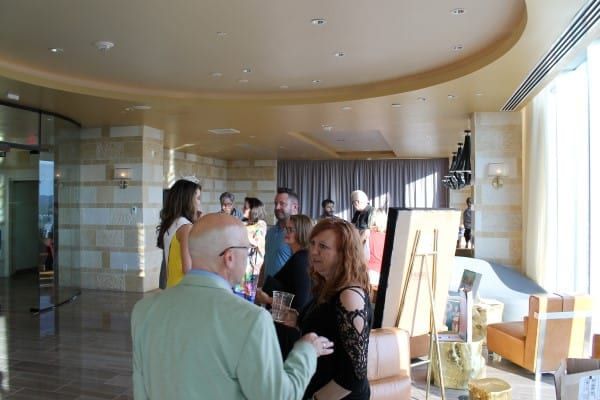Vanderbilt University officially dedicated it’s first ever center aimed at giving gay and lesbian students, faculty and staff a “space of their own” on Oct. 24, marking a milestone for the GLBT community at Vanderbilt.
A host of Vanderbilt dignitaries and officials attended the event, including Vanderbilt Chancellor Nick Zeppos, which officially opened the K.C. Potter Center and Office of LGBTQI Life, located in the Euclid House, 312 West Side Row, on the Vanderbilt campus.
Mark Bandas, associate Provost and dean of Students, welcomed those in attendance, and introduced the man for whom the center is named, retired Dean K. C. Potter.
Potter, who retired in 1998 as residential dean after more than 33 years at Vanderbilt (20 of which were spent as the University's chief housing and conduct officer), came to Vanderbilt as a student in the law school in 1961.
“Dean Potter was charming, and thanked many, including Dean Bandas and Sandy Stahl (who worked with Potter for several years), who has been a mentor and wonderful resources as we worked to get the Center up and running,” said Nora Spencer, director of the Office of LGBTQI Life. “Dean Potter also thanked his partner, Richard Patrick, who has been his companion for ten years. He also told a very moving story about being first to the scene of a suicide, where the student was someone that he knew was struggling with his sexual orientation; the student decided he would rather die than be gay.”
Chancellor Zeppos told the large group attending the dedication that the K.C. Potter center was just one small house in which students, who face the serious obstacle of homophobia, are able to gather and feel supported.
And during his remarks Zeppos referred back to the story that Potter told of the student who had “decided he’d rather die than be gay” and said the he had encountered those who had questioned if LGBTQI individuals should have an office or building dedicated for them, much as they questioned when the Bishop Joseph Johnson Black Cultural Center and the Ben Schulman Center for Jewish Life was created. Zeppos said that some wondered why majority students didn’t have their own cultural center, to which he replied, Isn’t all of campus a cultural space for majority students?
“Many in the audience were quite moved by his talk,” Spencer said.
Spencer said the LGBTQUI Life staff served the largest identity-based group on Vanderbilt’s campus, and that “LGBTQI students face clear and persistent hurdles toward their academic achievement and personal well-being as a result of living in a homophobic (or heterosexist) society.”
During her speech at the dedication show outlined a number of “new traditions” that the center would be undertaking, including:
- Every Friday from 11-1 the group gathers – people of all identities – for a brown bag lunch in a warm and casual atmosphere. “We call it TGILGBTQIF to honor our love of long acronyms,” she said.
- A first-ever Lavender Graduation will be planned.
- A course listing of classes that engage gender and sexuality issues is being compiled, so that students may continue to critically engage these topics as are their peers in nearly every academic discipline across the globe.
- A LGBTQI Speakers Bureau is being established, the will provide speakers in the classroom or co-host a program during which stories can be shared about coming out and being out – and help raise awareness and understanding.
- Launch a year-long visioning process, kicked off by a series of monthly Family Meetings, where LGBTQI issues on campus will be discussed and what the Center should do about them.
- Continue and strength the Safe Zone ally training program in partnership with the Psychological and Counseling Center.
Spencer also has announced that a new staff member has joined the LGBTQUI Life staff to help coordinate and plan programs for the students.
Sarah Benanti joined the Office of LGBTQI Life staff on October 20th as our program coordinator. Benanti hails Utah State University in Logan, UT where she ran a soil microbiology lab and, as a volunteer, developed the Allies on Campus training program, advised a number of LGBTQI student groups, and facilitated a speakers’ bureau program on gender and sexuality topics. She also ran a grassroots campaign that led to the creation of the LGBTQI center on USU’s campus in 2007. Several years ago Benanti served in a year-long internship with the National Gay and Lesbian Task Force in Washington, D.C., working in their membership department.
She has a B.S. From University of Illinois at Urbana in Natural Resource and Environmental Science and completed coursework toward an M.S. In Natural Resources at Utah State.
